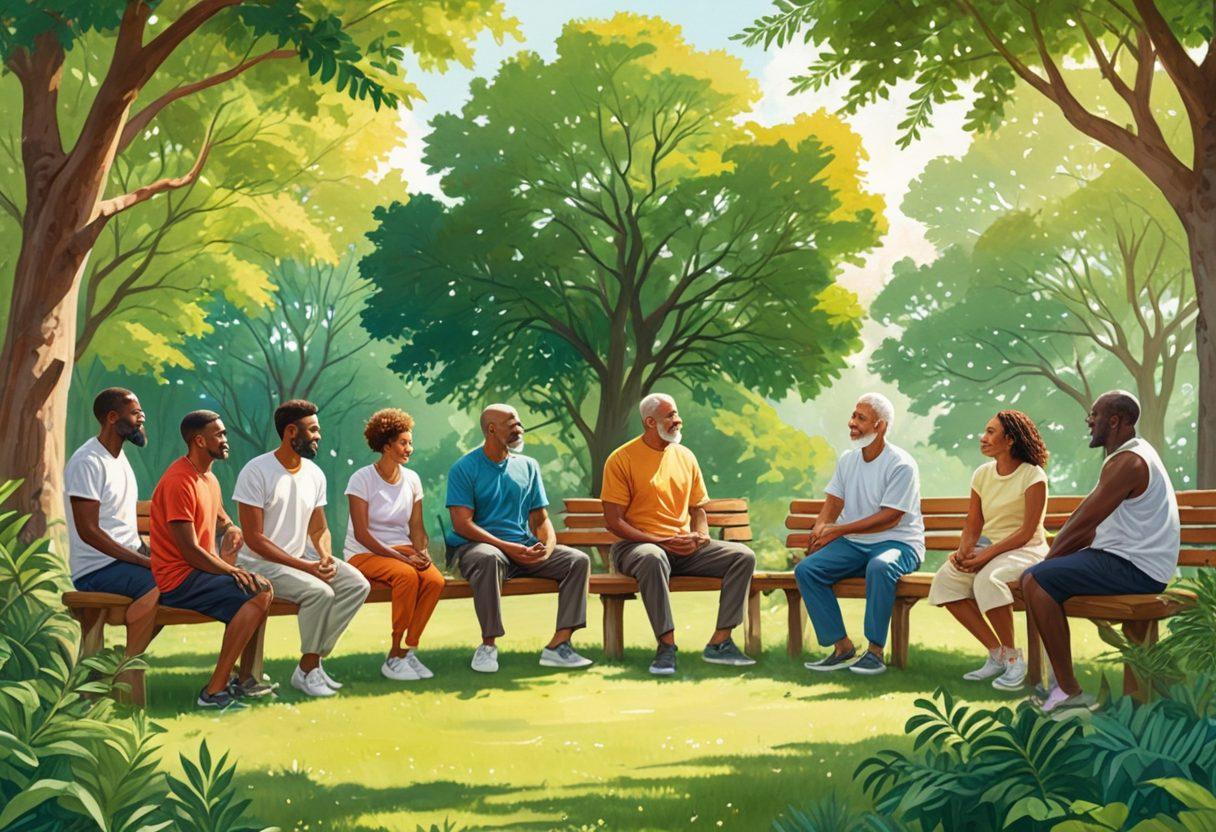Breaking the Silence: Addressing Men's Mental Health in America
In a world that often emphasizes the stoic ideals of masculinity, many men in America find themselves grappling with hidden struggles that threaten their mental wellness. Why is it that so many of us remain silent about our feelings, harboring a cloud of melancholy beneath the surface? Every day, countless men feel a sense of sorrowful isolation, believing they must suppress their emotions to fit the mold of traditional masculinity. Perhaps the biggest challenge we face is not only navigating our own emotional landscape but also confronting the societal norms that dictate how we should express our feelings.
Let's pause for a moment and ask ourselves: when was the last time we checked in on a male friend’s mental health—truly checked in? The stats are staggering: nearly one in ten men in the United States report feeling depressed, with many more battling overwhelming emotions in silence. This gloomy reality is often masked by the myths that surround men's mental health—assertions that suggest vulnerability is a weakness rather than a powerful exhibition of human resilience. If we are to unravel this narrative, we must be willing to unmask masculinity and allow male emotions to surface without fear or judgment.
The importance of emotional expression in our lives cannot be overstated. Allowing ourselves to feel—and articulate—our sorrowful experiences opens the door to genuine connection and understanding. Consider this: sharing our battles with depression doesn’t make us less manly; instead, it builds an empowering camaraderie among men. Imagine a world where men could openly express their gloomy days, where society offered unwavering support for men navigating these challenging moments. Wouldn’t it be refreshing to see the brave faces of individuals confronting their struggles head-on, together?
More importantly, what can we do to encourage conversations around men's issues in our daily lives? The first step towards improved men's health is often acknowledging the need for psychological support. It's crucial for men to practice self-care, which might mean reaching out to a friend, seeking professional help, or simply taking time to reflect on their feelings. By creating safe spaces that celebrate emotional expression rather than stigmatize it, we can foster an environment in which men's well-being is prioritized. Each one of us can contribute to this shift by being proactive listeners and compassionate supporters, promoting a culture of care instead of silence.
Finally, it is essential to advocate for a broader understanding of masculinity that encompasses more than just strength and stoicism. Men's mental health deserves to be a focal point in our conversations—because when we talk about men's well-being, we pave the way for everyone to flourish. Let us embrace vulnerability as a strength, to openly discuss our downcast moments, and to offer support in the same way we would like to receive. In doing so, we create not just better lives for ourselves, but a healthier future for generations of men in America. Remember, it's time to break the silence and reclaim the narrative of what it truly means to be a man in a world that needs us, vulnerable and whole.
From Sorrow to Strength: Empowering Men to Embrace Emotional Wellness
In a world where men have long been conditioned to suppress their feelings, the journey from sorrow to strength is more critical than ever. Often painted as the stoic warriors, many men grapple silently with their mental wellness, leading to feelings of melancholy, being depressed, or even feeling downcast. But what if we challenged these norms? What if we could empower men to embrace emotional wellness and redefine masculinity? It is time for us, as a society, to engage in open conversations about men's mental health and encourage emotional expression that leads to lasting change.
Imagine a young boy, taught from a young age that crying is a sign of weakness. Fast forward a couple of decades, and that boy grows into a man who feels gloomy and sorrowful but stifles his feelings because society deems it unacceptable. This journey too often leads to a plethora of men's issues: anxiety, depression, and a feeling of isolation. It's time to break that silence. Men need to know that seeking support for men or psychological support is not just okay—it’s essential for their well-being and the well-being of those around them. The first step in this progression is understanding that emotional vulnerability is a part of strength, not a deviation from it.
As we dive deeper into the subject of men’s mental health in America, let’s remember the words of author and mental health advocate, Terrence Real: 'Ignoring our emotions is a form of self-abuse.' This rings true for so many men who feel trapped between societal expectations of toughness and nurturing their emotional needs. By providing relatable narratives of men who have overcome their struggles and sought help, we can create a community that normalizes struggles with depression and sadness and fosters dialogues of empathy and understanding. The more we talk about these experiences, the more we can dismantle the traditional barriers around male emotions.
Self-care for men shouldn't be underestimated. By establishing simple yet effective routines such as exercise, mindfulness, or even just allowing time for reflection, men can create a foundation for mental wellness. It’s about recognizing that taking care of oneself isn’t selfish but necessary. Participate in activities that allow emotional expression—whether it’s journaling, art, or talking to a friend. Perhaps ask yourself, 'What is one thing I can allow myself to feel today?' That soft inquiry can lead to powerful breakthroughs and enable a rise from those sorrowful feelings to newfound strength.
Finally, as we champion the importance of male emotional expression, let’s remember to extend support to the men in our lives. Don’t be afraid to check in with your brothers, fathers, and friends. A simple question like, 'How are you feeling today?' can lead to meaningful discussions and show them they are not alone in their struggles. Each moment spent fostering these connections fills the enormous gap in the conversation around men’s health and sets the groundwork for a more emotionally intelligent generation. As we continue to break the silence around men’s mental health in America, let’s embrace the journey—together.
Breaking Barriers: The Importance of Support and Self-Care in Men's Lives
In the heart of America, an important conversation about men's mental health is starting to unfold. For so long, society has pushed the narrative that men should embody toughness, suppress emotional expression, and ignore their own well-being. But what happens when the weight of that societal expectation turns into sorrowful loneliness? This blog aims to break those barriers by emphasizing the profound importance of support and self-care in the lives of men. As we delve into the depths of their experiences, it becomes clear that addressing men's issues is not just a personal journey, but a societal responsibility as well.
Imagine a world where emotional expression is viewed as strength rather than weakness. Picture a scenario where the terms 'gloomy', 'unhappy', or 'depressed' are met with understanding rather than judgment. Men's mental health is often shrouded in silence, with many feeling downcast yet too afraid to seek the help they need. A staggering number of men suffer silently; the statistics around male depression reveal a staggering truth - many do not feel comfortable discussing their struggles. Yet, as we begin to foster conversations around male emotions, we inevitably unravel the stigma around masculinity. Are we ready to rewrite the narrative?
Support for men begins with breaking that incredibly thick barrier of silence. Have you ever wondered why so many of us find it hard to open up? Perhaps it’s rooted deeply in a cultural narrative that praises stoicism over vulnerability. However, acknowledging our feelings, whether melancholy sadness or overwhelming joy, is vital for psychological support. Every man deserves a space where he can explore these emotions without fear of judgment. That’s why finding allies in friends, family, or even support groups is an invaluable step towards improving men’s well-being. Remember, it’s truly okay to not be okay, and seeking help is a testament to one's strength!
Self-care for men is another critical aspect of nurturing mental wellness. It’s not just about hitting the gym or reading self-help books, though those can certainly play a role. Rather, it's about creating a holistic approach that includes regular check-ins with oneself. What sparks joy in your life? Do you let yourself indulge in hobbies or passions? Engaging in activities that bring satisfaction can combat feelings of being overwhelmed. Even simple practices like mindfulness or journaling can provide an outlet for male emotions that might otherwise be bottled up. The journey towards emotional and mental wellness can be a transformative one if we allow ourselves to engage in self-care.
In the end, addressing men’s mental health is not merely a personal endeavor; it reflects our collective consciousness as a society. We must lean into our discomfort and embrace conversations that promote psychological support and validate male emotions. If we as a society want to foster a brighter future for men's health and well-being in America, we need to redefine masculinity. Let us inspire each other, encourage self-care rituals, and provide support for men to embrace their feelings. The first step can begin with you. How might your story change as you break the silence?


